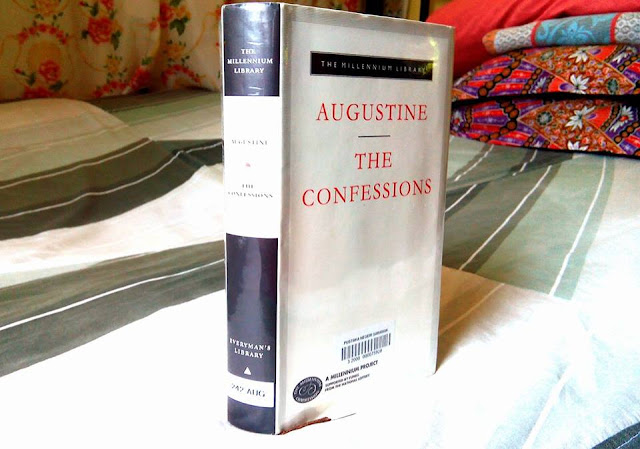The Confessions [Everyman's Library] (2001)
by St. Augustine translated by Philip Burton
“Great are you, O Lord, and worthy
of high praise. Great is your strength, and of your wisdom there is no
counting. Even man is, in his way, a part of your creation, and longs to praise
you; every man, who carries in himself his own mortality, that testimony of his
sin, that testimony also that you resist the proud; for all that, man is part
of your creation, and longs to praise you. You stir us up to take delight in
your praise; for you have made us for yourself, and our heart is restless till
it finds its rest in you” (Book 1.1.1). With that, St. Augustine of
Hippo begins his confessions.
It is said that
Augustine’s Confessions are our most
brilliant evidence for the spiritual and intellectual progress of a man in the
ancient world. Indeed, this autobiographical work is one of the most read books
in the ancient time since it was written in Latin between AD 397 and 400… but
not so today (maybe in the theological schools?). The works outline Augustine’s
sinful youth and his conversion to Christianity, sex life and immorality, his
friendships and godly mother, his inner struggles with the Truth and Meaning of
life, God’s hiddenness, mercy and grace. What unique about this book is that it
is written as prayers or conversations with God – Augustine is a rhetorician by
training – and actually meant to be read out loud.
[The word ‘confessions’ here come from the Hebrew
word meaning ‘praise.’ ‘Confession’
can be understood in two ways: with reference to our sins, or as praise to
God.”]
Augustine quoted lots of
Bible verses especially the Psalms of David, and few pagan writers and works.
Philip Burton, translator of this book, done a great job at translating this
work and noted from which verses and books Augustine quotes. Confessions is not an easy read, but
this Everyman’s Library translation is better than Penguin Classic’s, in my
opinion. This book consisting of 13 smaller books (first nine actually
autobiographical and the last four are commentary):
Book #1 Our Heart is
Restless
Book #2 Sinner Without a
Cause
Book #3 The Love of Wisdom
Book #4 Half My Soul
Book #5 The Flight from
Carthage
Book #6 Farewell My
Concubine
Book #7 Not in Our Stars
Book #8 God’s Civil
Servants
Book #9 Monica
Book #10 Remembrance of
Things Present
Book #11 ‘In the
Beginning…”
Book #12 ‘Heaven and
Earth’
Book #13 ‘Let there be
Light’
Once I talked with a
self-claimed Reformed Christian and asked him, “Have you read St. Augustine?” “Who?” he puzzled. “Okay, do you know who St. Augustine is?”
“No… who?” “Never mind,” I said. In the area of God’s grace and salvation, the
church and sacraments, predestination and freewill, famous Reformers like John
Calvin, Martin Luther, Ulrich Zwingli, John Knox, John Owen, and Jonathan
Edwards were greatly influence by Augustine. Augustinian Theology influence the
Reformation. Either you’re Reformed (or Reformed in theology but doesn’t
realized it) or not, read Augustine.
To me, what make Augustine’s story compelling is that
it’s our story too. In a world where
morality is generally low and lack of spiritual sensitivity, many of us wanted
to pursuit God but don’t know where to start. This book can help you. The
sovereign grace that he describes in this book is the same sovereign grace that
lost and thirsty souls need today.
Oh yeah :)
THINK BIG. START
SMALL. GO DEEP.


















